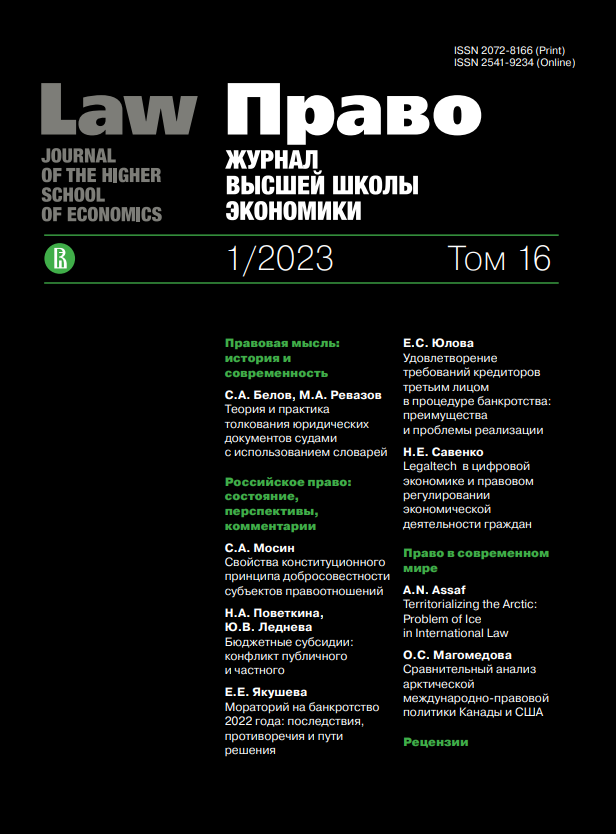Мораторий на банкротство 2022 года: последствия, противоречия и пути решения
Аннотация
Мораторий на банкротство впервые был применен в России во время пандемии в 2020 году. Одновременно с введением моратория Правительство Российской Федерации применяло дополнительные меры, стимулировавшие поддержку и развитие предприятий стратегически важных для экономики отраслей, что показало свою эффективность. В связи с экономическим кризисом, вызванным санкциями против России, в 2022 году Правительство повторно ввело мораторий на банкротство. В статье проанализирован механизм применения института моратория на банкротство в России и зарубежных странах, особенности его применения. Указаны и проанализированы последствия введения моратория вне рамок банкротных процедур, а именно: в рамках исполнительных производств, в отношении выплаты дивидендов и распределения прибыли. Приведена судебная практика, позиции и акты органов власти относительно субъектного состава, на который распространяется мораторий на банкротство. Автором исследованы точки зрения теоретиков и практиков на то, чьи интересы в приоритетном порядке должны соблюдаться в банкротных процедурах — кредиторов или должников; изучены возможные негативные последствия для добросовестных кредиторов, вызванные мораторием на банкротство. В работе раскрывается мнение о недобросовестности и возможном злоупотреблении правом со стороны участников гражданских правоотношений в условиях моратория. Приведенная в статье статистика в отношении возбужденных исполнительных производств в период с марта по апрель 2022 года затрагивает аспект стабильности гражданского оборота, наглядно демонстрирует последствия применения моратория. Автором рассмотрены пути решения спорных вопросов с указанием на позиции лиц, активно стремящихся заполнить пробелы, образовавшиеся на практике после введения «тотального» моратория на банкротство в 2022 году; также затронут вопрос о возможности (или фактической невозможности) граждан-физических лиц отказаться от введенного моратория. В статье исследуется значение института банкротства в условиях кризиса и наличие публично-правового интереса при введении моратория. Оценена возможность введения повторного моратория на банкротство в условиях санкций.Литература
Efremov V., Steshentsev A. et al. (2020) Moratorium on bankruptcy. Seven aspects to know. Bankovskoe obozrenie=Banking Review, no. 1, pp. 59-62 (in Russ.)
Genkin D.M. (1993) Competitive process. Vestnik vysshego arbitrazhnogo suda=Bulletin of Supreme Arbitration Court, no. 11, pp. 122-128 (in Russ.)
Gribanov V.P. (1992) Limits of implementation and protection of civil rights. Moscow: Rossiyskoye pravo, 207 p. (in Russ.)
Khimichev V.A. (2006) Implementation and protection of civil rights in insolvency (bankruptcy). Moscow: Wolters Kluwer, 228 p. (in Russ.)
Kravchenko A.A. (2015) On liability for dishonesty in insolvency (bankruptcy) relations. Predprinimatelskoye pravo=Business Law, no. 2, pp. 10-17 (in Russ.)
Osmanova D.O. (2020) Abuses in insolvency (bankruptcy). Moscow: Justitsinform, 184 p. (in Russ.)
Popondopulo V F. (2001) Bankruptcy law: regulation of insolvency. Moscow: Yurist, 331 p. (in Russ.)
Porotikova O.A. (2007) Abuse of subjective civil law. Moscow: Wolters Kluver, 245 p. (in Russ.)
Shershenevich G.F. (2021) Competition process. Moscow: Statut, 477 p. (in Russ.)
Shuvalov I.I. (2021) The institute of bankruptcy and its role in times of socioeconomic crisis. Zhurnal rossiyskogo prava=Journal of Russian Law, no. 12, pp. 108119 (in Russ.) DOI: https://doi.org/10.12737/jrl.2021.151
Sukhanov E.A. (ed.) (2011) Russian civil law. General part. Moscow: Statut, 958 p. (in Russ.)
Sukhanov E.A. (2006) Civil law: textbook. Moscow: Wolters Kluwer, 720 p. (in Russ.)
Telyukina M.V. (2004) Basics of competition law. Moscow: Wolters Kluwer, 506 p. (in Russ.)
Ulezko A.S., Filonovich A.G. (2020) Moratorium on bankruptcy: expectations of debtors and reality. Imushestnennye otnoshenia v Rossii=Property Relations in Russia, no. 7, pp. 68-79 (in Russ.)
Uda G. (2001) L'oggetivo della buona fede nella esecuzione del Contratto. Roma: 125 p. (in Italian)
Vlasova E.D. (2018) The institute of waiver of law: application in Russia and in foreign law systems. Leningradskyi juridicheskiy zhurnal='Leningrad Law Journal, no. 1, pp. 85-97 (in Russ.)
Copyright (c) 2023 Право. Журнал Высшей школы экономики

Это произведение доступно по лицензии Creative Commons «Attribution-ShareAlike» («Атрибуция — На тех же условиях») 4.0 Всемирная.


















